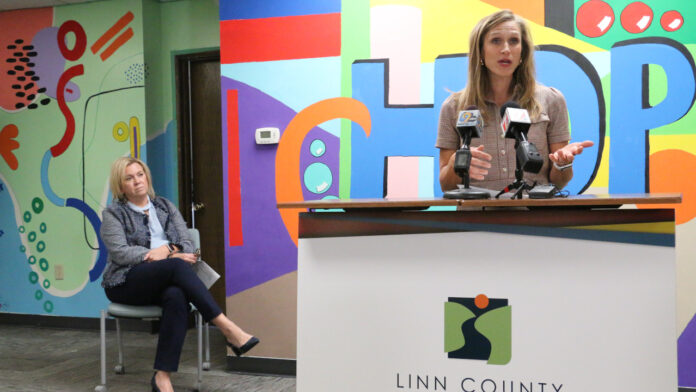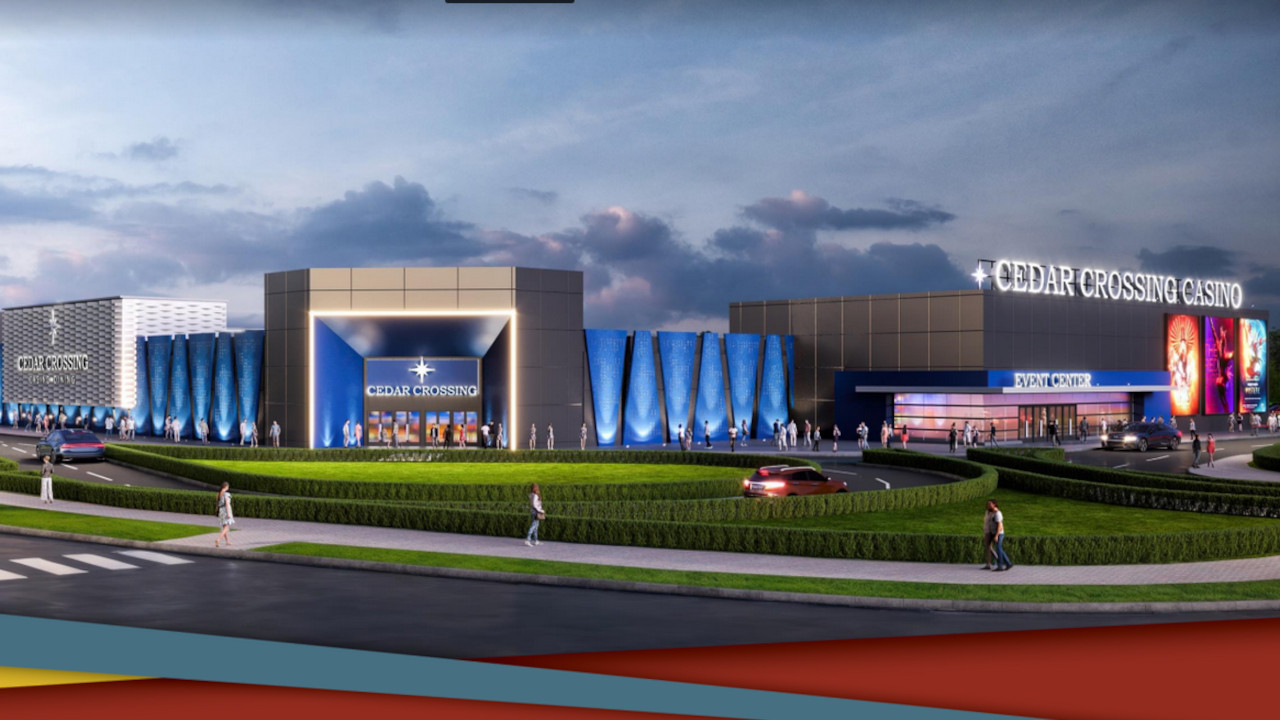
Representatives of several Linn County nonprofit agencies touted the financial benefits of a proposed Cedar Rapids casino for their organizations during a news conference Oct. 10 at the Four Oaks administrative offices on Collins Road NE in Cedar Rapids.
Developers of the proposed $275 million Cedar Crossing casino in Cedar Rapids say they plan to donate 8% of the casino’s net adjusted gross revenue to nonprofit organizations – more than twice the state-mandated minimum. Supporters say about $6.3 million will be generated for nonprofits each year if a gaming license for the proposed casino is approved by the state’s Racing and Gaming Commission in February.
Speakers at the news conference say the additional revenue will provide a significant new source of revenue for their nonprofit organizations, many of which have struggled in recent years with higher demands for service and reduced revenue streams.
“More often than anyone can imagine, children come to us in diapers (and) without clothing in case of an emergency,” said Jessica Fergesen, senior fund development director for Four Oaks, a statewide child welfare and behavioral health organization based in Cedar Rapids. “We are constantly raising funds to help children in our care experience a sense of normalcy during a traumatic time. Whether a child is in residential treatment or foster care, we use donor dollars for anything from shoes, coats, hats, hygiene, essentials, school supplies, journals and even birthday parties. That’s what we can provide with funding from this project.”
John Tursi, executive director of the Boys & Girls Clubs of the Corridor, said the opening of two casinos and a dog track in Dubuque “changed everything for Dubuque, and quite frankly, it became a huge tourist city.”
He said that the departure of several corporate headquarters has left many nonprofits without the financial support those companies had previously provided, and that organizations like the Boys & Girls Clubs have had to significantly raise the hourly pay for their employees in the wake of the COVID-19 pandemic.
“It’s a lot tougher now that numbers move so big and so fast,” he said.
Stacie Eastman, development director for the Eastern Iowa Health Center in Cedar Rapids, said the funding support from a Cedar Rapids casino would assist the organization’s patients with several unmet needs, including copay assistance, short-term food insecurity, transportation, mental health and housing.
“EIHC receives a federal grant that is supposed to bridge the gap between what we’re able to charge our patient for services and the cost it takes to provide those services,” Ms. Eastman said. “Unfortunately, that funding has not changed significantly in many years, leaving us a gap that we attempt to fill with grants, donations and fundraising. The 8% of net adjusted gross revenue that Peninsula Pacific Entertainment has committed for charitable contributions would help us fill the gap.”

Kristin Roberts, president and chief executive officer of the United Way of East Central Iowa, said a recent ALICE (Asset Limited Income Constrained Employed) report indicated that one-third of working Iowans are unable to pay for basic needs through their employment, and that the figure in Linn County is 25%.
“In the last couple of years, with the pandemic, the derecho, the near recession, our nonprofit sector is stretched beyond its nonprofit capabilities,” she said. “The collaboration between our nonprofits is amazing, to the point where we are a star and a beacon within the state of Iowa. But even with that exclusive amount of collaboration, our nonprofits are still struggling to keep up with the capacity of the need that they have coming to their doors.”
Todd Bergen, secretary and treasurer of the Linn County Gaming Association, which would work with Peninsula Pacific Entertainment to oversee the distribution of casino proceeds to nonprofit agencies, said that as part of working with nonprofits throughout his career, he “saw firsthand the demand for support of our nonprofit community.”
“The Linn County Gaming Association is passionate about the opportunity to provide additional support, which is why we’re so vehemently in support of the Cedar Crossing project,” Mr. Bergen said.
Other speakers at the news conference included Linn County Gaming Association president Anne Parmley, Freedom Foundation executive director Lexi Coberly and Cedar Valley Animal Shelter executive director Lonnie Viner.
It’s not yet clear how the 8% of casino proceeds would be distributed to area nonprofit agencies.
The Iowa Racing and Gaming Commission continues to evaluate the Cedar Rapids casino plan. An open house and site visit is slated in Cedar Rapids Nov. 20, allowing community members to share their views or ask questions about the proposal and its potential impacts.
Two market studies commissioned by the IRGC regarding the Linn County casino proposal are due to be submitted by Dec. 30, and those market studies will be presented at the commission’s regular meeting in Jefferson Jan. 25.
The commission’s final vote on the Linn County gaming application is slated for a special meeting Feb. 6.




